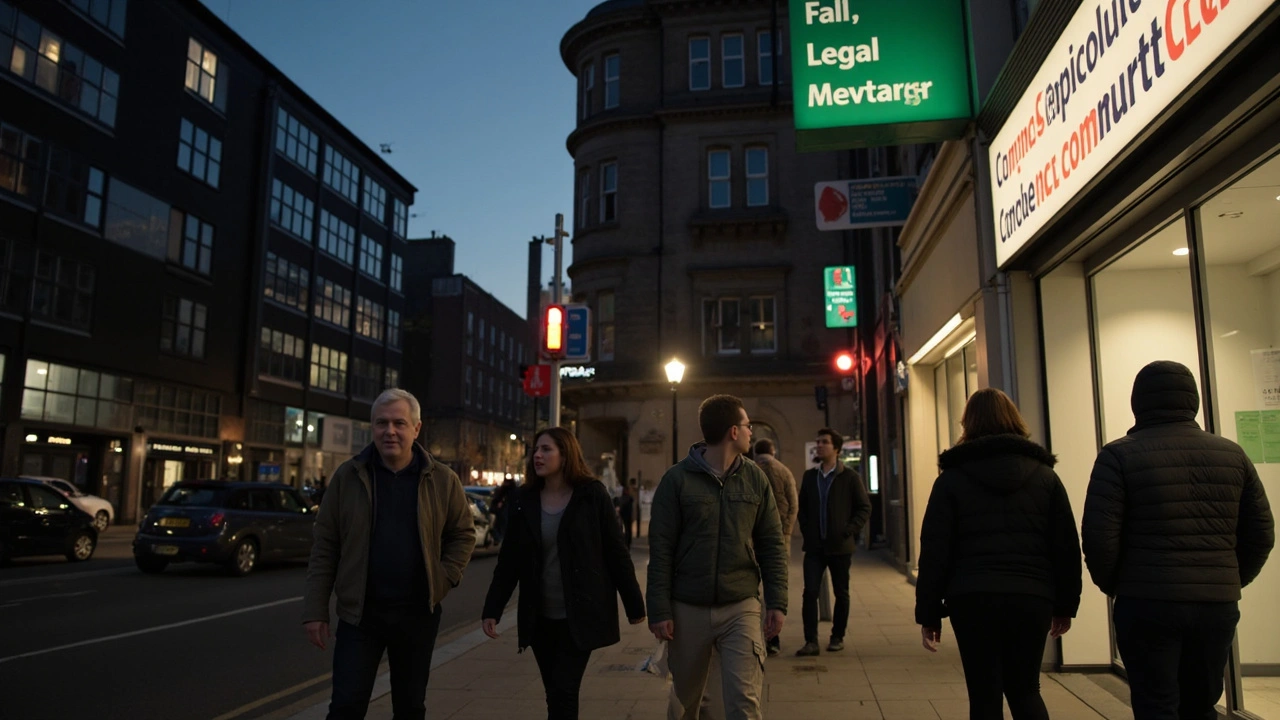Sex Workers Worldwide: Culture, Laws, and Social Views

On a bright night in Amsterdam, windows glow red and laughter spills onto the cobblestones. A few hours later in Tokyo, someone slips into a hidden club, seeking a different thrill, while in India, sacred rituals blend temple dancing with sexuality. Sex work has always been part of the human story, shaping and being shaped by culture, power, and survival. But what’s it really like to be a sex worker in different corners of the world? Why do some places turn a blind eye, while others throw the book at anyone daring to sell pleasure?
There’s no single answer. History, religion, economy, and even politics all play a part. In some countries, selling sex is regulated like any other business. In others, even talking about it is taboo. Some societies celebrate sex workers as artists, while others shame them into the shadows. Rules and attitudes keep shifting too. Suddenly, what’s normal in one decade—or on one side of a border—becomes illegal in the next. Want a sneaky peek at how sex work really looks in London, Mumbai, Buenos Aires, or Dubai? Let’s pull back the curtain.
What Does Sex Work Really Mean? Contexts and Definitions
Sex work isn’t just one thing. It covers a lot—escorting, street-based work, brothels, strip clubs, online camming, sugar dating, adult film acting, massage parlors, and even ancient forms of ritual sex. Don’t fall for the myth that sex workers are all the same, or that the job looks like it does in Hollywood thrillers. Some earn a stable living in legal, protected situations. Others face daily threats or stigma just for trying to survive.
It matters how societies define—or refuse to define—the role of a sex worker. In the Netherlands, sex work has been legal since 2000, and brothels must be licensed. There are health checks, rights, and even a union for sex workers. The average age of a sex worker here is much higher than you might guess, and many describe their job as “just work,” not so different from other service roles. Compare that to the United States, where the law is a tangled mess: in Nevada, brothel work is tightly regulated and legal; nearly everywhere else, sex workers risk arrest, fines, or worse. If you cross the border into Canada, sex work itself isn’t illegal, but almost everything around it is (like buying sex or advertising services).
Then there are places like Thailand, famous for lively red-light districts, where sex work is technically illegal but enforcement is lax. Many brothels double as massage parlors or karaoke bars, and the jobs are a lifeline for rural migrants. Flip the coin and look at Saudi Arabia or Iran, where sex outside marriage is punishable by imprisonment or, in severe cases, even death. Here, underground economies emerge: coded ads, risky meetups, and constant fear.
What makes it all so tricky is the emotional side—shame, pride, secrecy, rebellion, independence, or all of these at once. Sex workers are mothers, fathers, students, artists, immigrants, and sometimes activists. They write books, run businesses, and campaign for legal reforms. In short, one label does not fit all. Understanding context is everything if you want to know the truth about sex work worldwide.
Culture, Law, and Daily Life: How Sex Workers Live Around the Globe
Peek behind the scenes in cities like Amsterdam, and you’ll find sex workers have legal rights and regular hours. They pay taxes, take time off, and sometimes have retirement plans. A 2022 study suggested that nearly 10% of the Dutch population supported full decriminalization—among the highest in Europe. But elsewhere, things look and feel very different.
In countries like New Zealand, decriminalization has helped boost sex workers’ safety and health. Workers can report crimes without fear of police harassment, and brothels are inspected for basic working conditions. Street-based workers, often the most vulnerable, still face risks, but at least they're less afraid that calling for help could land them in jail. A survey by the New Zealand Prostitutes’ Collective found self-reported violence dropped significantly after legalization in 2003.
Contrast that with Singapore, where certain licensed brothels operate quietly under police watch, but unlicensed workers face steep fines and deportation. In India, selling sex isn’t illegal—pimping, running brothels, or soliciting are. This legal confusion leaves many workers vulnerable to police abuse and extortion. Religious history throws in more complications: Devadasis in southern India, once honored as dancers serving deities in temples, are now seen as outcasts despite their historical status.
Look at Latin America: in parts of Colombia, Argentina, and Brazil, sex work is tolerated or legalized, but trafficking and exploitation are hot-button issues. Buenos Aires has unionized brothels and even public bulletins listing legal rights for sex workers. But in rural settings, workers face violence and social exclusion. In Mexico, sex workers sometimes organize for collective protection, especially in border towns where cartel and police violence are common threats.
Then you’ve got the Gulf States, where strict Islamic laws mean sex work is deeply underground. Workers—mostly migrants from Africa, South Asia, or Eastern Europe—live with daily fear. Social stigma can be so intense that getting caught means not just jail time but permanent exile from family and faith communities.
Everywhere you look, daily life as a sex worker is shaped by laws and attitudes. Some enjoy autonomy and decent pay; others struggle to keep their heads above water in a sea of discrimination, danger, or isolation. The details change, but the root challenges—safety, stigma, and survival—are nearly universal.

Benefits, Struggles, and Realities: Why Sex Work Exists and Persists
If you ask sex workers why they do the job, you’ll get as many answers as there are people. For some, it’s about flexible hours and decent money—the chance to pay the rent, cover family expenses, or save for a degree. Recent research in London found that nearly 70% of sex workers said autonomy and better pay were their main reasons for entering the industry.
But it’s never simple. Societies in Sweden or Norway have tried the so-called “Nordic model”—criminalizing buyers but not sellers, meant to fight trafficking and reduce demand. However, many sex worker groups argue that this just pushes the work further underground, making it harder for workers to screen clients or seek help from police. A 2020 study in Norway reported an increase in violence against sex workers after these laws were introduced, as clients grew more fearful of being reported and insisted on secretive, unsafe arrangements.
There’s also the issue of health. In places like Germany, regular health checks are the norm in licensed brothels, and workers can access support services without fear. STIs and HIV rates among legal sex workers here are similar to—sometimes even lower than—the general population. But in Nigeria, the stigma is so great that many workers avoid clinics altogether, even if they are unwell.
On the other hand, some cultures hold deep respect for sacred sexuality. Historically, Japan’s oiran and geisha offered artistry alongside pleasure; in ancient Greece, hetairai were companions to poets and politicians. Today, those traditions have faded, but the echoes remain. Some modern workers reframe their role as healers or educators, especially in places like Berlin or San Francisco where intersectional activism is strong.
Sex work persists because the demand for intimacy—transactional or emotional—never goes away. Legal crackdowns, moral crusades, or economic recessions barely dent it. Instead, they push it out of sight, often making it more dangerous. But give people rights, protection, and agency? That’s where you start seeing sex workers standing proud, not hiding in fear.
Here’s a quick look at how a few countries compare on laws, safety, and social acceptance:
| Country | Legality of Sex Work | Health/Safety Provisions | Public Attitude |
|---|---|---|---|
| Netherlands | Legal & regulated | Mandatory health checks, unions exist | Largely tolerant, visible red-light districts |
| United States | Illegal except in some Nevada counties | Limited to legal brothels in Nevada | Mixed, often stigmatized |
| New Zealand | Legal (since 2003) | Strong protections, decriminalized status | Relatively positive, improving over time |
| India | Legal with heavy restrictions | Limited, often informal | Stigma remains high |
So, if you're curious about why sex work remains such a hot-button issue, look at the mix of benefits, risks, and the stubborn need for connection, whatever the cost.
Navigating the Risks: Safety, Rights, and Tips for Sex Workers Worldwide
If you’re thinking about sex work, or just want to better understand the reality behind the headlines, safety comes first. Even in legal settings, risks pop up: difficult clients, police harassment, health concerns. But there are tools and strategies that can make a big difference.
First tip: know the local law. In the UK, for example, selling sex is not illegal, but activities like brothel-keeping or soliciting are. In Germany, legalized brothels provide some support, but street-based work is more exposed. Apps and community groups can help workers share info on dangerous clients or safe workspaces. The Ugly Mugs project in the UK, for instance, lets sex workers alert each other about violent individuals.
Second, health checks. In places like Australia or New Zealand, clinics offer discreet sexual health services, sometimes free of charge. Testing regularly for HIV and other STIs isn’t just about self-care—it’s about protecting the community. Carrying condoms (and knowing your rights if police try to use them as "evidence") saves lives.
Third, screen your clients if you can. Use messaging tools or verified booking systems that let you say no if something feels off. Never share your real surname, address, or banking details unless you're 100% sure about the person or agency.
Fourth, support networks are a game-changer. Whether it’s online forums, WhatsApp groups, or drop-in centers, connecting with other sex workers means you’re never truly alone. In Spain and Latin America, some cities even have legal aid or psychological support, funded by local councils or NGOs.
And if you ever feel unsafe, don’t hesitate to call local organizations or hotlines for help. Many countries now have advocacy groups that protect sex worker rights, like Amnesty International or SWARM in the UK. It’s their job to make sure you’re seen not as a problem, but as a person deserving respect and dignity.
One practical tip: always have a coded emergency plan. Agree on a safe word or quick text for trusted friends, so someone can check on you if you don’t respond. Simple, but it saves lives. Another idea? Keep copies of your important documents hidden but accessible in case you need to move quickly.
If you’re curious about the local sex worker scene or want to support rights movements, check out cultural forums, city guides, or advocacy group events. Walk into Amsterdam’s Prostitution Information Centre, for example, and you’ll hear candid stories directly from those doing the job. Learning is the first step to fighting stigma.
Sex work can be dangerous, draining, or liberating—sometimes all in the same day. But it’s always deeply human. With more knowledge, compassion, and honest conversations, maybe we can build a world where nobody has to choose between dignity and survival, no matter where they live.

